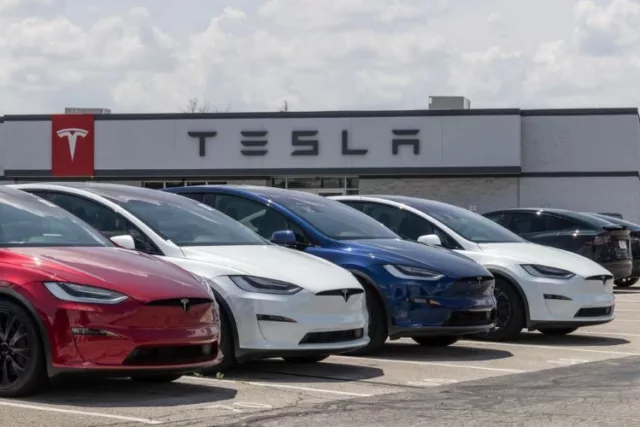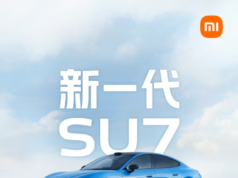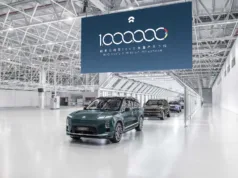Over the last decade, the electric vehicle (EV) market has experienced historic growth. In 2024, global EV sales reached a record 17.1 million units, marking a 25% increase over 2023. This surge meant that 14.5% of all light-duty vehicle sales worldwide were EVs, up from 11.45% the previous year.
In the U.S., EV sales grew to approximately 1.3 million units in 2024, a 7.3% increase from 2023, accounting for 8.1% of total new vehicle sales. By 2030, it’s estimated that the global EV market size will expand from 12.5 million units in 2022 to nearly 45.9 million units by 2030, at a compound annual growth rate (CAGR) of 23%.
As EV adoption accelerates, several companies are emerging as key players in the market.
In the table below, we’ve listed the top ten largest global EV companies by market capitalization as of May 1, 2025. Though Chinese automakers largely dominate the list, three U.S. companies and one from Vietnam are also included.
| EV Company | Market Cap* | Country |
| 1. Tesla | $922.96 billion | USA |
| 2. Xiaomi | $166.84 billion | China |
| 3. BYD | $146.54 billion | China |
| 4. Li Auto | $25.12 billion | China |
| 5. XPeng | $18.14 billion | China |
| 6. Rivian | $16.17 billion | USA |
| 7. NIO | $9.02 billion | China |
| 8. Leapmotor | $8.37 billion | China |
| 9. VinFast Auto | $8.05 billion | Vietnam |
| 10. Lucid Motor | $7.95 billion | USA |
* Editor’s Note: Numbers are subject to change — accurate on the date of publication.
Largest Manufacturers of Electric Vehicles/Battery Electric Vehicles
Here’s a more in-depth view of each of these companies. We’ve also included some information on notable traditional ICE automakers that have caused quite a stir with their EV lines a little further down.
1. Tesla

Image Credit: Jonathan Weiss/Shutterstock
With a market cap nearing a trillion dollars, Tesla is the largest EV manufacturer in the world. The company had almost half a million global BEV sales in the last quarter of 2024, and a profit of $409 million. The Texas-based company stands out from the rest because of its in-house software management, limited SKUs, and manufacturing agility. While Tesla is notoriously secretive about where it sources its materials, what makes its EV chips unique is the use of silicon carbide.
Despite having the highest BEV market share in the world, the company recently faced a 40% drop in profit amid increasing competition and internal challenges, as well as other much-publicised disruptions related to Tesla founder and CEO Elon Musk. Even still, Tesla remains at the top of the proverbial EV food chain and doesn’t appear to be budging anytime soon.
2. Xiaomi

Image Credit: Tada Images/Shutterstock
Xiaomi is a Chinese company that designs and manufactures consumer electronics and automobiles. The company entered the EV market with the SU7 sedan in 2024, and in early 2025, it raised $5.5 billion to expand its EV operations.
Although it’s nowhere near Tesla’s, Xiaomi has a current market cap of over $166.84 billion, making it the second-largest EV maker in the world. The company sold 136,854 of its SU7 series vehicles in 2024.
3. BYD

Image Credit: Chatchai Somwat/Shutterstock
BYD Auto, a subsidiary of China’s BYD Company, is the third-largest EV maker in the world and the leading manufacturer of plug-in electric vehicles. BYD’s lineup includes battery electric vehicles (BEVs) and plug-in hybrids, with popular models like the Dolphin, Seal, and BYD Qin compact and mid-size sedans. In 2024, BYD sold over 4.3 million vehicles—a 41.3% increase from the previous year. The company hit its best month of sales in April 2025, with 380,089 units.
Up until 2022, the company was still making purely ICE vehicles, but stopped to focus entirely on new energy vehicles. With new factories in Hungary and plans for more facilities in Europe and South America, the BYD Group is expanding its global operations to cement its place on the EV leaderboard firmly. In addition, BYD’s subsidiary, FinDreams Battery, was the world’s second-largest EV battery producer in 2024.
4. Li Auto

Image Credit: Robert Way/Shutterstock
Li Auto, a China-based EV manufacturer, follows next with a market cap of $25.12 billion. According to the automaker, it prides itself on pioneering large-scale extended-range EVs in China, a segment that it gives most of its focus to (and an area that Tesla has mostly ignored).
Li Auto delivered 500,508 vehicles in 2024—an impressive 33.1% increase from 2023. The company’s Li ONE is a six-seater EREV SUV and the automaker’s first model. The vehicle has an impressive range and high engine performance relative to pure EVs. The company is often touted as «China’s Toyota.”
5. XPeng

Image Credit: Tada Images/Shutterstock
XPeng is a Chinese EV manufacturer known for its smart, tech-forward vehicles, which are particularly popular with younger drivers. The company’s lineup includes models like the P7 sedan and the G9 SUV, which feature advanced driver-assistance systems and connectivity options.
The company, founded in 2014, has a market cap of $18.14 billion and delivered 190,068 vehicles in 2024—a 34% year-over-year increase. XPeng has also partnered with Volkswagen Group to develop a super-fast charging network to improve the EV charging infrastructure in China.
6. Rivian

Image Credit: Tada Images/Shutterstock
Like Li Auto, California-based Rivian has found success by plugging the gaps in the EV market, focusing on adventure-ready electric trucks and SUVs. In 2024, the company delivered 51,579 vehicles—including its R1T pickup, R1S SUV, and commercial vans—and made a $170 million gross profit in the last quarter.
Amazon first rolled out Rivian’s electric delivery vehicles in 2022, planning to bring 100,000 more to various cities throughout the U.S. by 2030. As of late 2024, Rivian had delivered over 20,000 of these vans to Amazon.
The automaker, which has a market cap of over $16 billion, also has a unique take on camping vehicles, offering a unique feature called “Camp Mode”, made especially for outdoor enthusiasts. Introduced in 2022, the latest update of this innovative technology allows users to level the vehicle on uneven terrain and manage energy usage during overnight stays for more comfortable and efficient camping experiences.
7. NIO

Image Credit: Sundry Photography/Shutterstock
NIO, another Chinese EV manufacturer, has a market cap of just over $9 billion and a dynamic lineup of vehicles. This includes several sleek sedans alongside both mid- and full-sized SUVs. NIO’s EP9 supercar set a record in 2017 as the world’s fastest production electric car, before being overtaken by the Rimac Nevera in 2022.
In 2024, NIO’s revenue was approximately $7.98 billion, with a record 72,689 cars delivered in Q4 alone. These included models from its premium lineup as well as nearly 20,000 units from its newly launched family-oriented brand, ONVO. The company operates two manufacturing plants in Hefei, Anhui, China, and in April 2025, introduced a third brand, FIREFLY, aimed at the compact EV market.
NIO has set up battery-swapping facilities throughout China, where consumers can go to a service station and switch their drained battery for a fully charged one in only three minutes. In 2025, the company reported over 70 million completed battery swaps, with hundreds of stations across China. More recently, battery giant CATL invested up to $345 million in NIO’s Power division to help expand the battery-swapping network.
8. Leapmotor

Image Credit: testing/Shutterstock
Leapmotor is a Chinese EV startup founded in 2015 with a $8.37 billion market cap. The company focuses on producing affordable electric vehicles for the mass market and offers a range of models, including compact cars and SUVs for urban drivers.
The company delivered 293,724 vehicles in 2024—a 103.8% increase from 2023—and reported $11.2 million earnings in Q4 2024. Notably, Leapmotor became the second Chinese EV startup to achieve profitability, and it did so one year ahead of its schedule.
8. VinFast Auto

Image Credit: alexkoral/Shutterstock
VinFast Auto, founded in 2017, is a Vietnamese EV manufacturer that has rapidly expanded its presence in the market. A subsidiary of Vingroup (Vietnam’s largest private conglomerate), VinFast offers a range of sustainable transportation solutions, including all-electric cars and scooters
In 2024, VinFast delivered 97,399 electric vehicles, a 192% increase from the previous year. The company has a market cap of around $8 billion, and plans to open new assembly plants in India and Indonesia by the end of 2025.
10. Lucid Motors

Image Credit: Around the World Photos/Shutterstock
Lucid Motors, the sleek EV startup known for its high-end design and serious performance, has a market cap of $7.95 billion. In 2024, the company produced 9,029 vehicles, delivered 10,241 (70% more than the year prior), and reported $235 million in revenue in Q4 2024, with its annual revenue hitting just over $800 million.
The company, which also supplies batteries to the Formula E racing series, is planning on increasing production at its Arizona facility, with officials saying the expansion would accommodate the vertical integration of numerous manufacturing processes. The company aims to increase its capacity to 150,000 cars, a goal backed by Saudi Arabia’s Public Investment Fund, which owns about 60% of Lucid Motors.
Automotive Giants Also Making Electric Cars
Not to be overlooked, here are some traditional automakers that have opened up successful EV divisions. Although they face competition from EV giants like Tesla and BYD, these companies have found success with their EV lineups in recent years.
General Motors
GM had a great 2024, selling 43,976 EVs in Q4—a whopping 363% jump from the previous year. The company now has nine EV models across its brands: Cadillac (Lyriq, Escalade IQ, and IQL), Chevy (Blazer EV, Equinox EV, Silverado EV, BrightDrop Zevo 400 and 600, plus the now-discontinued Bolt EV and EUV), and GMC (Hummer EV Pickup and SUV, and Sierra EV). The Chevrolet Equinox EV led the pack with nearly 29,000 units sold, followed by the Cadillac Lyriq and the Chevy Blazer EV. Thanks to this growing lineup, GM is now the second-largest EV seller in the U.S., right behind Tesla.
Volkswagen Group
In 2004’s first quarter, the VW Group—which includes brands like Audi, Porsche, and Skoda—sold about 136,400 all-electric vehicles globally, a slight 3.3% dip from the previous year. Despite this, models like the ID.4 and ID.3 are still popular, and the group’s incoming EV orders in Western Europe more than doubled. In Q1 2025, VW overtook Tesla with over 65,000 BEVs sold—a huge 157% jump from the same time last year.
Hyundai Motor Group
Hyundai and Kia, part of the Hyundai Motor Group, are also contending in the EV world. The popularity of models like the Hyundai Ioniq 5 and Kia EV6 is giving them a strong presence in the plug-in market, and the companies have expressed their desire to expand their electric lineups. The company was also named EV brand of the year at the 2025 Electrifying Awards.
Toyota
Toyota, the global leader in car sales, sold around 140,000 EVs worldwide in 2024—a 33% jump from the year before. That might sound good, but this number is minuscule compared to the company’s total sales, making up less than 2%. That said, Toyota still plans to roll out around 15 electric models by 2027, with a goal of making about a million EVs a year.
Ford
Ford’s EV sales grew quite a bit in 2024, selling almost 98,000 electric models in the U.S., 35% more than the previous year. The Mustang Mach-E was the most popular with over 51,000 units sold, followed by the F-150 Lightning and the E-Transit van. Ford’s EV sales have recently dipped, but the company is confident they will pick up again soon.
Volvo
Volvo, owned by Chinese conglomerate Geely Auto, sold 175,194 fully electric vehicles globally in 2024—a 54% increase from the previous year, which accounted for 23% of its sales volume. To achieve a sustainable future, Volvo introduced an EV battery «passport” on its flagship EX90 SUV to track material origins and carbon footprint in 2024. In the same year, the company entered into a joint venture with Rivian to develop advanced architecture and software for future EVs, and also launched its Battery Energy Storage System (BESS), designed to provide customers with a reliable renewable energy source.
BMW Group
In 2024, the BMW Group delivered 368,523 fully electric vehicles globally—an 11.6% increase from the previous year. There’s been strong demand for the company’s light vehicles, like the i4, iX1, and i5, and others under the BMW brand. In Europe, BMW‘s monthly EV sales even surpassed Tesla’s for the first time in July 2024. The company is committed to electrification, aiming for EVs to make up 25% of its total car sales in 2025.
Mercedes-Benz
Similar to other brands like BMW, Hyundai, and Volvo, legacy automaker Mercedes-Benz has also expanded into EVs with its EQ lineup, featuring models like the EQB, EQE, and EQS. In 2024, the company sold around 240,600 fully electric vehicles—a 73% jump from the previous year—with EVs accounting for roughly 11% of its overall sales. The brand recently launched its clever hybrid-electric CLA, and is working toward full electrification by 2030.
The EV Market Is Growing

Image Credit: Shutterstock/BELL KA PANG
In the first quarter of 2025, EV volumes continued to climb, especially in key markets like China and Europe. However, sales contracted slightly in countries like South Korea, Japan, and the U.S. The dip can be attributed to consumer concerns over charging infrastructure, as well as political uncertainties. Despite these challenges, the market is still on the up. In the future, environmentally conscious customers and those searching for more fuel-efficient vehicles will have even more vehicle options.
This article was originally written by Sarah Edwards and updated by the Thomas Insights team in May 2025.









